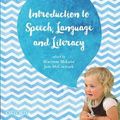
Introduction to Speech, Language and Literacy
Sharynne McLeod
Introduction to Speech, Language and Literacy is written for Australian and New Zealand students studying education, speech pathology and linguistics, fields with a strong focus on communication. This book provides readers with a theoretical understanding of speech, language and literacy acquisition, and the ability to apply this understanding to individuals of different ages and developmental stages, including those who are developing typically and those with speech, language and literacy difficulties (e.g. as a result of structural or functional impairments such as hearing loss, social-pragmatic difficulties such as autism, or acquired conditions such as aphasia after a stroke). Throughout, indigenous people and languages of Australia and New Zealand are included, as well as people from other cultural and linguistic backgrounds. Introduction to Speech, Language and Literacy uses a lifespan approach to consider communication skills from childhood to adolescence and adulthood. Typical acquisition is described throughout the book and many chapters provide tables of typical milestones or developmental sequences. Readers are provided with descriptions of difficulties people may have acquiring speech, language and literacy skills, and strategies are provided for educators, speech pathologists and linguists to support speech, language and literacy.The broader audience for this book includes professionals in education, speech pathology and linguistics, as well as professionals and students in: child development, psychology, phonetics, English as a foreign language, early childhood, inclusive/special education, deaf or hard of hearing, audiology and learning disabilities.Key FeaturesInteractive ebook includes 10 video case studies - showing Australian children (aged 2, 4, 5 and 7), university students, and a retired teacher. Readers are encouraged to use the videos as real life examples of the content within the chapters. The look and learn video activities at the end of most chapters enables application and consolidation of knowledge.Case studies - the authors draw on their professional practice to describe other cases that are illustrative of the chapter content and its real-world applicationEach chapter summary includes key messages for educators, speech pathologists, and linguists to show how the content is relevant for each profession at the end of each chapter challenge readers to recall and apply what they have learned. The critical reflections can be used to facilitate discussions in tutorial groups and workshops and have been designed to have constructive alignment with the objectives of the chapter.Features the The International Phonetic Alphabet (revised to 2005) and the Australian and New Zealand English consonants, vowels and illustrative words for quick reference
Booko found 2 book editions
Product filters
| Product |
Details
|
Price
|
New
|
Used
|
|---|---|---|---|---|
|
|
New: Being refreshed...
Used: Being refreshed...
|
New: Being refreshed...
Used: Being refreshed...
|
Being refreshed... | Being refreshed... |
|
|
New: Being refreshed...
Used: Being refreshed...
|
New: Being refreshed...
Used: Being refreshed...
|
Being refreshed... | Being refreshed... |
Booko collects this information from user contributions and sources on the internet - it is not a definitive list of editions. Search Booko for other editions of Introduction to Speech, Language and Literacy.



















